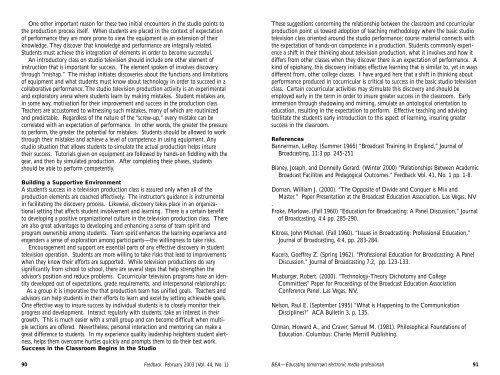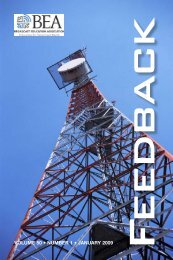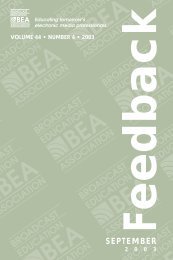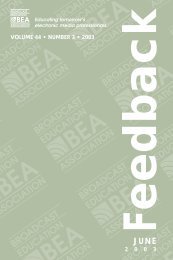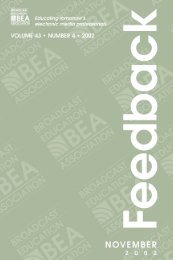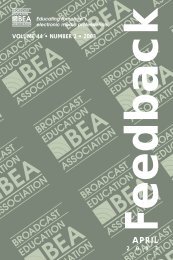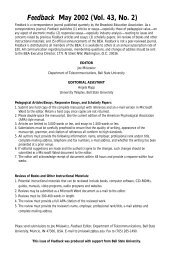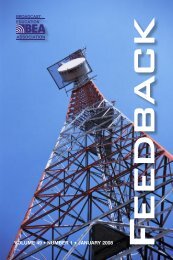DIGITAL STORYTELLING!
Feedback February 2003 (Vol. 44, No. 1) - Broadcast Education ...
Feedback February 2003 (Vol. 44, No. 1) - Broadcast Education ...
You also want an ePaper? Increase the reach of your titles
YUMPU automatically turns print PDFs into web optimized ePapers that Google loves.
One other important reason for these two initial encounters in the studio points tothe production process itself. When students are placed in the context of expectationof performance they are more prone to view the equipment as an extension of theirknowledge. They discover that knowledge and performance are integrally related.Students must achieve this integration of elements in order to become successful.An introductory class on studio television should include one other element ofinstruction that is important for success. The element spoken of involves discoverythrough “mishap.” The mishap initiates discoveries about the functions and limitationsof equipment and what students must know about technology in order to succeed in acollaborative performance. The studio television production activity is an experimentaland exploratory arena where students learn by making mistakes. Student mistakes are,in some way, motivation for their improvement and success in the production class.Teachers are accustomed to witnessing such mistakes, many of which are routinizedand predictable. Regardless of the nature of the “screw-up,” every mistake can becorrelated with an expectation of performance. In other words, the greater the pressureto perform, the greater the potential for mistakes. Students should be allowed to workthrough their mistakes and achieve a level of competence in using equipment. Anystudio situation that allows students to simulate the actual production helps insuretheir success. Tutorials given on equipment are followed by hands-on fiddling with thegear, and then by simulated production. After completing these phases, studentsshould be able to perform competently.Building a Supportive EnvironmentA student’s success in a television production class is assured only when all of theproduction elements are coached effectively. The instructor’s guidance is instrumentalin facilitating the discovery process. Likewise, discovery takes place in an organizationalsetting that affects student involvement and learning. There is a certain benefitto developing a positive organizational culture in the television production class. Thereare also great advantages to developing and enhancing a sense of team spirit andprogram ownership among students. Team spirit enhances the learning experience andengenders a sense of exploration among participants—the willingness to take risks.Encouragement and support are essential parts of any effective discovery in studenttelevision operation. Students are more willing to take risks that lead to improvementswhen they know their efforts are supported. While television productions do varysignificantly from school to school, there are several steps that help strengthen theadvisor’s position and reduce problems. Cocurricular television programs have an identitydeveloped out of expectations, grade requirements, and interpersonal relationships.As a group it is imperative the that production team has unified goals. Teachers andadvisors can help students in their efforts to learn and excel by setting achievable goals.One effective way to insure success by individual students is to closely monitor theirprogress and development. Interact regularly with students; take an interest in theirgrowth. This is much easier with a small group and can become difficult when multiplesections are offered. Nevertheless, personal interaction and mentoring can make agreat difference to students. In my experience quality leadership heightens student alertness,helps them overcome hurtles quickly and prompts them to do their best work.Success in the Classroom Begins in the StudioThese suggestions concerning the relationship between the classroom and cocurricularproduction point us toward adoption of teaching methodology where the basic studiotelevision class oriented around the studio performance; course material connects withthe expectation of hands-on competence in a production. Students commonly experiencea shift in their thinking about television production, what it involves and how itdiffers from other classes when they discover there is an expectation of performance. Akind of epiphany, this discovery initiates effective learning that is similar to, yet in waysdifferent from, other college classes. I have argued here that a shift in thinking aboutperformance produced in cocurricular is critical to success in the basic studio televisionclass. Certain cocurricular activities may stimulate this discovery and should beemployed early in the term in order to insure greater success in the classroom. Earlyimmersion through shadowing and miming, simulate an ontological orientation toeducation, resulting in the expectation to perform. Effective teaching and advisingfacilitate the student’s early introduction to this aspect of learning, insuring greatersuccess in the classroom.ReferencesBannerman, LeRoy. (Summer 1966) “Broadcast Training In England,” Journal ofBroadcasting, 11:3 pp. 245-251Blaney, Joseph, and Donnelly Gerard. (Winter 2000) “Relationships Between AcademicBroadcast Facilities and Pedagogical Outcomes.” Feedback Vol. 41, No. 1 pp. 1-8.Dornan, William J. (2000). “The Opposite of Divide and Conquer is Mix andMaster.” Paper Presentation at the Broadcast Education Association. Las Vegas, NV.Froke, Marlowe. (Fall 1960) “Education for Broadcasting: A Panel Discussion,” Journalof Broadcasting, 4:4 pp. 285-290.Kitross, John Michael. (Fall 1960). “Issues in Broadcasting: Professional Education,”Journal of Broadcasting, 4:4, pp. 283-284.Kucera, Goeffrey Z. (Spring 1962). “Professional Education for Broadcasting: A PanelDiscussion.” Journal of Broadcasting 7:2, pp. 123-133.Musburger, Robert. (2000). “Technology-Theory Dichotomy and CollegeCommittees” Paper for Proceedings of the Broadcast Education AssociationConference Panel. Las Vegas, NV.Nelson, Paul E. (September 1995) “What is Happening to the CommunicationDisciplines?” ACA Bulletin 3, p. 135.Ozman, Howard A., and Craver, Samuel M. (1981). Philosophical Foundations ofEducation. Columbus: Charles Merrill Publishing.90Feedback February 2003 (Vol. 44, No. 1)BEA—Educating tomorrow’s electronic media professionals 91


